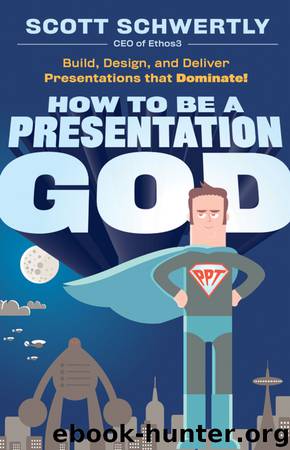How to be a Presentation God: Build, Design, and Deliver Presentations that Dominate by Scott Schwertly

Author:Scott Schwertly
Language: eng
Format: epub
Publisher: Wiley
Published: 2011-01-10T16:00:00+00:00
Chapter 8
Styles and Approaches
Have you ever noticed that there is no such thing as an uncreative child? Take a look around the next time you’re at the park: How many briefcases do you see? Are any three-year-olds taking meeting notes so that there is a record of the day’s play? Are any of the children in the sandbox pontificating about style guide violations?
Of course, by the time children reach grade school, we adults have usually found a way to tamp down their wild spirit. Cars don’t have mouths. Grass can’t be pink. Alligators don’t have sheep heads. Blah, blah, blah.
I’ve never been able to discover what adults love so much about conformity. Maybe it’s the month-by-month pressure of bills that leads us to crave predictability. Or maybe we trade the pursuit of novel excitement for stability (try as we might). Whatever it is that leads us to shun creativity, it is a thorough impulse that happens to nearly all of us. Reclaiming the free-spirited brain of youth takes a concerted level of energy and practice; however, it is a vital step in the quest for presentation god status.
The first thing we need to do is rethink our definition of creativity. If it means the ability to create something new or unseen, then why have we been designating landscape artists as creative? If it means, quite simply, having the ability to create a tangible object of any sort—be it art, furniture, writing, songs—then why do we consider a philosopher’s ideas so creative? The truth is, most of our assumptions about what is and is not creative are handed down, generation after generation, without a second thought as to accuracy, consistency, or relevance. If we feel we fit the archetypal creative mold, we live with the sense that we are, indeed, creative. If we somehow do not, we surrender the benefits of creative living to others.
I see this trend frequently among businesspeople. Business is hardly considered an art, yet millions upon millions of businesspeople create marketing programs, new products or services, more efficient organizational structures—the list goes on and on—every single day. Years ago, upon recognizing that nearly everyone with whom I came in contact was creative in some respect, I began to develop a new, more inclusive definition of creativity, one that didn’t reserve the honorable distinction for prodigious and eccentric hermits living in the backwoods of the Rocky Mountains, for instance.
My definition is this: Creativity is problem solving. It fits across the board: The landscape painter identifies a problem—that a beautiful scene is fleeting and changeable—and seeks to capture it on canvas. The philosopher is keenly aware of a logical inconsistency and seeks to address it in the mind. The businessman recognizes an unmet desire in society and brings a remedy to market. If we are going to transmit our ideas to one another, we first need to cultivate a sincere confidence that our ideas are worth their weight in gold. Imagine if Michelangelo had lacked the confidence to put
Download
This site does not store any files on its server. We only index and link to content provided by other sites. Please contact the content providers to delete copyright contents if any and email us, we'll remove relevant links or contents immediately.
| Bookkeeping | Business Mathematics |
| Business Writing | Communications |
| Decision Making | Negotiating |
| Project Management | Running Meetings & Presentations |
| Secretarial Aids & Training | Time Management |
| Training |
Nudge - Improving Decisions about Health, Wealth, and Happiness by Thaler Sunstein(7670)
Deep Work by Cal Newport(6978)
Principles: Life and Work by Ray Dalio(6313)
The Doodle Revolution by Sunni Brown(4720)
Factfulness: Ten Reasons We're Wrong About the World – and Why Things Are Better Than You Think by Hans Rosling(4719)
Eat That Frog! by Brian Tracy(4486)
Thinking in Bets by Annie Duke(4192)
Hyperfocus by Chris Bailey(4090)
Visual Intelligence by Amy E. Herman(3757)
Writing Your Dissertation in Fifteen Minutes a Day by Joan Bolker(3703)
Ogilvy on Advertising by David Ogilvy(3569)
Hidden Persuasion: 33 psychological influence techniques in advertising by Marc Andrews & Matthijs van Leeuwen & Rick van Baaren(3529)
How to Win Friends and Influence People in the Digital Age by Dale Carnegie & Associates(3525)
How to win friends and influence people by Dale Carnegie(3448)
The Pixar Touch by David A. Price(3396)
Schaum's Quick Guide to Writing Great Short Stories by Margaret Lucke(3352)
Deep Work: Rules for Focused Success in a Distracted World by Cal Newport(3193)
Work Clean by Dan Charnas(3085)
The Slow Fix: Solve Problems, Work Smarter, and Live Better In a World Addicted to Speed by Carl Honore(2985)
